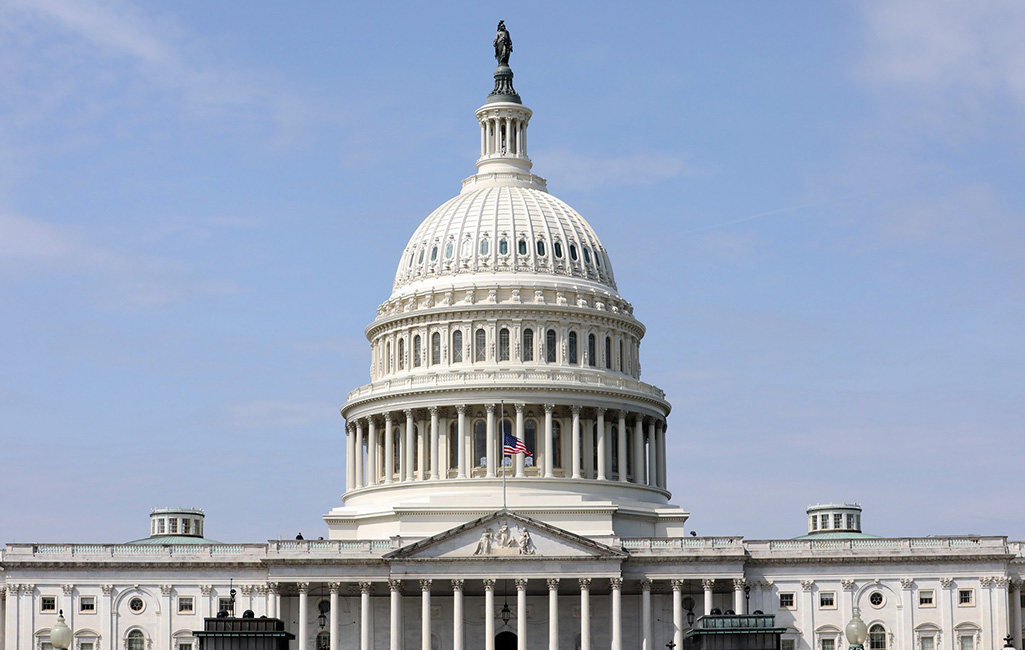
U.S. Capitol
WASHINGTON – Congress included pro-life and conscience protections in a massive omnibus spending bill that gained final approval Friday (Dec. 23).
The House of Representatives voted 225–201 Friday for a nearly $1.7 trillion appropriations package that will fund federal agencies through September 2023. The Senate passed the legislation in a 68-29 roll call Thursday (Dec. 22). The bill, which will go to President Biden for his signature, gained support in the Democratic-controlled Congress from 18 Republicans in the Senate and only nine in the House.
The Southern Baptist Ethics & Religious Liberty Commission (ERLC) had urged congressional leaders in November to restore the Hyde Amendment and other pro-life “riders,” as they are known, to the spending bills proposed at that time. While the ERLC expressed disappointment with portions of the final measure, it was pleased with the inclusion of bans on federal funding of abortion and protections of conscience rights.
“Even though a bipartisan consensus has existed for years that no taxpayer funding should be used for abortion, that sentiment has diminished in recent years, putting the Hyde Amendment and other pro-life riders in jeopardy,” ERLC President Brent Leatherwood told Baptist Press Friday.
“The ERLC, along with our pro-life partners, strongly advocated for their inclusion in this omnibus and, thankfully, those calls were heeded by lawmakers,” he said in emailed comments. “Our nation’s financial resources should not be used to take innocent life, and we will keep defending that principle as long as it takes.
“Of course, with such a massive spending bill, lawmakers try to attach all manner of proposals to the legislation,” Leatherwood said. “While we wish more helpful policies protecting life and respecting human dignity would have been added, we were glad to see several harmful provisions stripped, including ones related to abortion tourism and targeting faith-based agencies in the adoption space.
“Preventing bad ideas from becoming law is, at times, just as valuable as passing new laws. In these areas, that is certainly the case.”
The ERLC had advocated for other measures that were not in the final spending package, including a long-term solution for undocumented immigrants who were brought to the United States as children and enhanced border security, a path to permanent legal status for Afghan and Ukrainian evacuees, and reform to a sentencing disparity in drug-related crimes.
Earlier spending proposals demonstrated another effort by Democratic leaders to eliminate from the budget the Hyde Amendment and other pro-life riders, which must be approved each year. The Hyde Amendment – the best known of the pro-life riders — has barred federal funds in Medicaid and other programs from paying for abortions in every year since 1976. It has saved the lives of an estimated 2½ million preborn children.
Last year, the Democratic-controlled House approved spending measures without Hyde and other pro-life protections. Spending proposals offered by the Senate’s Democratic leadership also excluded the policies. In addition, President Biden’s budget proposal failed to include the abortion-funding bans.
Congress was unable to pass a final budget for the 2022 fiscal year without the pro-life riders, and Biden finally signed into law an omnibus bill in March of this year that included the protections.
Amid the efforts to eliminate the pro-life riders, messengers to the Southern Baptist Convention’s 2021 meeting called for the retention of the Hyde Amendment and all pro-life riders in spending bills.
In a Nov. 18 letter this year, Leatherwood cited the SBC resolution in encouraging Senate and House leaders in both political parties to include the pro-life riders in the final appropriations legislation. He also called for Congress to protect the religious freedom of faith-based, social-service providers.
“These amendments save lives and protect American consciences,” Leatherwood wrote.
In addition to Hyde, the other pro-life riders the ERLC urged congressional leaders to reinstate in final spending legislation, and Congress approved, included the:
— Weldon Amendment, which has barred since 2004 funding for government programs that discriminate against healthcare individuals or institutions that object to abortion.
— Helms Amendment, a rider first approved in 1973 that prohibits foreign aid funds from being used for abortion as a method of family planning.
— Dornan Amendment, which was first adopted in 1988 and has barred in most of the years since federal and congressionally approved local funds from paying for abortions in the District of Columbia.
— Smith Amendment, which has barred in nearly every year since 1984 federal employee health plans from paying for abortions.
The spending package approved by Congress altered but did not eliminate some abortion rights proposals the ERLC protested.
It rescinded an earlier permanent ban proposed on the Mexico City Policy, which bars organizations from receiving federal funds unless they agree not to perform or promote abortions internationally. The final version permits organizations that perform abortions to receive global family planning funds, though that money is not to pay for the procedure directly, according to the ERLC. Biden repealed the policy, which was first instituted by President Reagan in 1984.
The omnibus bill also maintained $32.5 million in funds for the United National Population Fund (UNFPA), which has been linked to support of China’s coercive, population-control program. The total was a marked reduction of what had been proposed earlier, the ERLC reported. The SBC entity had objected to earlier efforts to weaken or ignore the Kemp-Kasten Amendment, a 1985 measure that bans overseas family planning money from going to any organization that is involved in a program of forced abortion or sterilization.
Among the proposals opposed by the ERLC and excluded from the final legislation, according to the commission, were:
— A ban on funds from the Department of Health and Human Services for faith-based organizations, such as adoption and foster-care agencies, that decline to provide services to same-sex couples based on their religious convictions.
— $350 million in grants for organizations that help women seeking abortions, including those who travel to another state.
— $2 million to fund additional research “promoting further adoption” of the lesbian, gay, bisexual, transgender and queer agenda.
The ERLC posted on its website an analysis of the final spending package in a Thursday article by Policy Manager Hannah Daniel.
The spending package included almost $47 billion in aid to Ukraine to combat Russia’s invasion.
(EDITOR’S NOTE – Tom Strode is Washington bureau chief for Baptist Press.)


